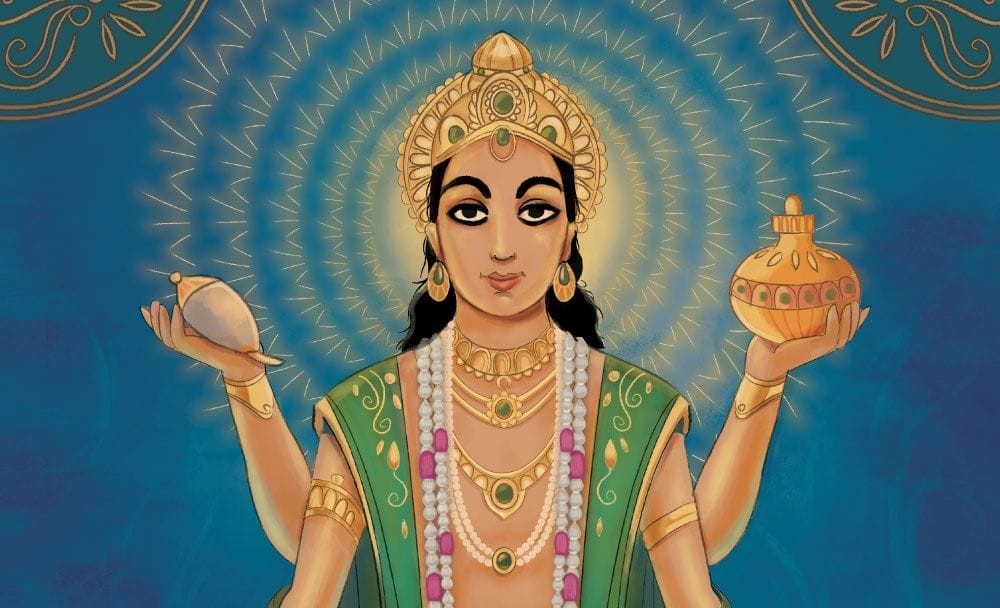Ayurveda is a Sanskrit word that means “the science of life,” and it is based on the principles of maintaining a balance between mind, body, and spirit to promote health and prevent disease. Ayurveda has been used to treat a wide range of health issues, from common colds and fevers to more serious conditions like cancer and diabetes.
The God Dhanvantari is considered the founder of Ayurveda, and his teachings are still used in Ayurvedic medicine today. [1] [2] In this article, we will discuss who God Dhanvantari is and his importance in Ayurveda.
Who is Dhanvantari God?
Dhanvantari is a Hindu deity who is worshipped as the God of Medicine. In the ancient Sanskrit text Vishnudharamottara, Dhanvantari is described as a handsome individual who is typically depicted with four hands. One or two of his hands usually hold a bowl of Amrita, which is considered the elixir of immortality.
Dhanvantari’s appearance is quite similar to that of Vishnu, and he is often portrayed holding a Shankha, Chakra, Jalauka (Leech), and a pot of Amrita in his four hands.
In some depictions, he can be seen holding medicinal herbs and a book of Ayurveda, while in others, a Leech is present in his hand, which represents the historical practice of bloodletting. In certain texts, Dhanvantari is portrayed holding a conch, a bowl of amrita, medicinal herbs, and a book of Ayurveda.[3] [4]
Dhanvantari is revered as the founder of Ayurveda because he is said to have taught the principles of Ayurveda to a group of sages who recorded his teachings in the form of texts known as the Charaka Samhita and the Sushruta Samhita. These texts are considered the oldest and most comprehensive texts on Ayurveda, and they are still used as a reference in Ayurvedic medicine today. [3] [4]
Dhanvantari is also associated with the festival of Diwali, which is celebrated in India and other parts of the world. On Diwali, people worship Dhanvantari and pray for good health and prosperity. [3] [4]
Origin of God Dhanvantari
According to the Bala Kanda of the Ramayana and Bhagavata Purana, Dhanvantari emerged from the Ocean of Milk during the Samudra Mathana, when the devas and asuras were churning the ocean using the Mandara mountain and the serpent Vasuki. He appeared carrying the pot of amrita, which is the elixir of immortality.
The asuras managed to seize the pot of amrita, but Vishnu’s avatar, Mohini, appeared and retrieved it from them. It is widely believed that Dhanvantari is responsible for promoting the practice of Ayurveda. [5] The Dhanvantari-Nighantu is a notable treatise on medicinal plants, which offers a comprehensive understanding of Dhanvantari’s work in this field. [6]
Importance of God Dhanvantari in Ayurveda
God Dhanvantari’s teachings form the foundation of Ayurveda, and his principles are still used in Ayurvedic medicine today. The following are some of the ways in which God Dhanvantari is important in Ayurveda:
1. Diagnosis and Treatment
According to Ayurveda, every individual is unique and has a specific constitution or Prakriti. Prakriti is determined by the balance of the three doshas or energies in the body: Vata, Pitta, and Kapha.
Dhanvantari’s teachings emphasize the importance of understanding an individual’s prakriti to diagnose and treat illnesses. Ayurvedic practitioners use various methods, including pulse diagnosis, to determine an individual’s prakriti and tailor treatment accordingly. [7] [8]
2. Medicines
Ayurvedic medicines are prepared from natural herbs, minerals, and other materials. Dhanvantari’s teachings emphasize the use of natural remedies to promote health and prevent disease.
Ayurvedic medicines are prepared based on the principles of doshas, Prakriti, and imbalances in the body. Ayurvedic medicines are designed to treat the root cause of the illness rather than just the symptoms. [7] [8]
3. Lifestyle
Ayurveda emphasizes the importance of living a healthy lifestyle to maintain good health and prevent disease.
Dhanvantari’s teachings emphasize the importance of following a balanced diet, getting adequate exercise, and managing stress to maintain good health. Ayurvedic lifestyle practices include yoga, meditation, and pranayama to promote overall health and well-being. [7] [8]
4. Surgery
Dhanvantari’s teachings also include surgical procedures, which were advanced for their time. The Sushruta Samhita, one of the texts believed to have been authored by Dhanvantari, describes various surgical procedures for conditions such as cataracts, hernias, and fractures.
These procedures were performed using techniques such as suturing, using surgical instruments, and using anesthesia. Ayurvedic surgery was known for its precision and lack of side effects, making it a popular alternative to traditional surgery. [7] [8]
5. Massage and Therapies
Ayurvedic massage and therapies are an essential part of Ayurvedic medicine. These therapies are designed to restore balance to the body and promote relaxation and healing.
Dhanvantari’s teachings include various massage and therapy techniques, including Panchakarma, which is a detoxification process that involves five different therapies.
Ayurvedic massages are performed using natural oils and herbal preparations, and they are designed to improve circulation, relieve stress, and promote overall well-being.[7] [8]
6. Nutrition
Dhanvantari’s teachings emphasize the importance of nutrition in maintaining good health. Ayurvedic nutrition is based on the principles of doshas and Prakriti, and it is designed to promote balance and prevent imbalances in the body.
Ayurvedic nutrition emphasizes the use of fresh, whole foods and the avoidance of processed foods and artificial additives. Ayurvedic nutrition also emphasizes mindful eating and chewing food properly to aid digestion. [7] [8]
7. Mental Health
Ayurveda emphasizes the importance of mental health in maintaining overall well-being. Dhanvantari’s teachings include various practices, including meditation and yoga, to promote mental health and emotional balance. Ayurvedic practitioners also use herbal remedies and other therapies to treat mental health conditions such as anxiety and depression. [7] [8]
FAQs
1. Is Ayurvedic medicine safe?
Ayurvedic medicine is generally considered safe when practised by trained and licensed practitioners. However, as with any medical practice, there are potential risks and side effects associated with certain treatments or remedies. It is important to consult with a qualified practitioner before beginning any Ayurvedic treatment.
2. How is Ayurvedic medicine different from Western medicine?
Ayurvedic medicine differs from Western medicine in several ways. Ayurvedic medicine is a holistic system of medicine that emphasizes the importance of balancing the body, mind, and spirit to promote health and prevent disease. Western medicine, on the other hand, tends to focus on treating specific symptoms or conditions using medications or surgeries.
3. Can Ayurvedic medicine be used alongside Western medicine?
Ayurvedic medicine can be used alongside morden medicine, but it is important to consult with a qualified practitioner before combining treatments. Ayurvedic remedies and practices may interact with Morden medications, and it is important to ensure that any combination of treatments is safe and effective.
4. Is Ayurvedic medicine effective?
Ayurvedic medicine has been used for thousands of years to promote health and prevent disease, and many people find it to be effective. However, more research is needed to determine the effectiveness of specific Ayurvedic treatments and remedies.
5. Where can I find a qualified Ayurvedic practitioner?
Qualified Ayurvedic practitioners can be found in many parts of the world, but it is important to ensure that they are licensed and trained. The National Ayurvedic Medical Association (NAMA) and the Ayurvedic Practitioners Association (APA) are two organizations that can help you find qualified practitioners in your area.
Conclusion
God Dhanvantari is an essential figure in Ayurveda, and his teachings continue to influence Ayurvedic medicine today. His teachings emphasize the importance of maintaining balance in the body, mind, and spirit to promote health and prevent disease. Ayurvedic medicine is a holistic system of medicine that addresses the root cause of the illness rather than just treating the symptoms. Ayurvedic medicine includes various practices, including diagnosis and treatment, natural remedies, lifestyle practices, surgery, massage and therapies, nutrition, and mental health. Ayurvedic medicine continues to gain popularity worldwide, and it is an essential part of the world’s healing traditions.
References:
Dhanvantari, Dhanvamtari: 22 definitions (wisdomlib.org)
The Indian God Dhanvantari(www.jstor.org)
The Illustrated Dictionary of Hindu Iconography – Margaret Stutley – Google Books
Textbook of Ayurveda – Vasant Lad – Google Books
Valmiki Ramayana Bala Kanda – vālmīki rāmāyaṇē bālakāṇḍa – Stotra Nidhi
Review On Dhanvantari Nighantu – An Important Ayurvedic Lexicon | International Journal of Ayurveda and Pharma Research (ijapr.in)
Ayurveda — The Ancient Scientific Medicine with Natural Healing(researchgate.net)
Development of Ayurveda – Tradition to trend – PubMed (nih.gov)





















